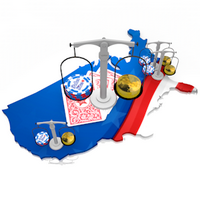US Legislation
 Online poker in the US has never been and probably never will be illegal. While some outsiders, and possibly insiders, will assert that playing online poker in the US is an offence, the reality of the situation is that it’s not. Although certain legal restrictions made it virtually impossible for operators to offer US online poker games, players weren’t actually breaking the law by grinding at the virtual felt.
Online poker in the US has never been and probably never will be illegal. While some outsiders, and possibly insiders, will assert that playing online poker in the US is an offence, the reality of the situation is that it’s not. Although certain legal restrictions made it virtually impossible for operators to offer US online poker games, players weren’t actually breaking the law by grinding at the virtual felt.
Essentially, when it comes to US legislation, online poker ran into problems when the government implemented the Unlawful Internet Gaming Enforcement Act (UIGEA [PDF]) as part of the SAFE Port Act. Before politicians decided to mess with the industry and make US poker deposits virtually impossible, the game was thriving. Big money tournaments, generous giveaways and mainstream advertisements ensured that players in their millions enjoyed the virtual version of the game. However, since US online poker legislation became a proverbial “grey area”, the number of operators and players in America has dropped substantially.
Fortunately, however, that grey cloud is starting to part and things in the USA are now looking a lot brighter. To give you a better idea of online poker US legislation, let’s run through its main points moving from the implementation of UIGEA to the current changes in poker regulation in America.
What is UIGEA?
 The Unlawful Internet Gaming Enforcement Act (UIGEA) was passed in 2006 and outlawed the processing of funds between online poker companies and US citizens; something which subsequently made it almost impossible to play online for real money. Although the bill excluded fantasy sports betting and wagers exchanged between tribal gaming operators, it basically rendered the entire US online poker economy obsolete.
The Unlawful Internet Gaming Enforcement Act (UIGEA) was passed in 2006 and outlawed the processing of funds between online poker companies and US citizens; something which subsequently made it almost impossible to play online for real money. Although the bill excluded fantasy sports betting and wagers exchanged between tribal gaming operators, it basically rendered the entire US online poker economy obsolete.
Following this piece of US legislation, online poker as an industry took a nosedive as a number of operators were forced to pull out of the North American market. In fact, it was not only the US poker economy that suffered but the industry in general. However, despite the fact operators were facing possible legal repercussions; no players were in any danger of being prosecuted. Basically, although UIGEA made it illegal for sites to process online gaming funds, that didn’t mean that players were under threat of arrest. This fact made it possible for a selection of operators to stay active in the country.
Black Friday
 Although the sites that remained live in the USA were technically not allowed to host real money games because of US online poker legislation, the operators argued that they weren’t actually breaking the law. This defense kept them out the DOJ’s fining line for a few years, but in 2011 three major poker sites: PokerStars, Full Tilt Poker and Absolute Poker were shutdown.
Although the sites that remained live in the USA were technically not allowed to host real money games because of US online poker legislation, the operators argued that they weren’t actually breaking the law. This defense kept them out the DOJ’s fining line for a few years, but in 2011 three major poker sites: PokerStars, Full Tilt Poker and Absolute Poker were shutdown.
This fateful day in the history of online poker became known as Black Friday and sent the community into a spin. With US players facing a lengthy delay before they could get hold of their bankrolls, the industry suffered its second major slump. Not only that, but in order for PokerStars and Full Tilt to remain operational and have any chance of re-entering the US in the future, each company was required to pay a huge fine to the DOJ.
At the time, Absolute Poker was unable to meet the DOJ’s demands and effectively went into liquation, while Full Tilt also found itself struggling. Fortunately, PokerStars had built up a huge fortune and not only found a way to pay the DOJ, but cover Full Tilt’s fine as well. This transaction was part of a larger deal that saw PokerStars’ parent company, the Rational Group, take control of Full Tilt.
US Online Poker: Then and Now
 Before Black Friday and UIGEA dealt powerful blows to the industry, online poker was a booming enterprise. Players, operators and investors all enjoyed many years of prosperity. One of the most notable aspects of pre US online poker legislation was that the games were a lot easier. Because the game was mainstream and virtually a national pastime, casual grinders were much more common and that meant big profits for skilled players.
Before Black Friday and UIGEA dealt powerful blows to the industry, online poker was a booming enterprise. Players, operators and investors all enjoyed many years of prosperity. One of the most notable aspects of pre US online poker legislation was that the games were a lot easier. Because the game was mainstream and virtually a national pastime, casual grinders were much more common and that meant big profits for skilled players.
Unfortunately, US legislation caused the fish to swim away and the professional players to stay. This resulted in a rise in the standard of the average player and, thus, made it harder for novice grinders to make a profit online.
However, as time has gone on, the climate in the US has gradually begun to change. Although it was possible to play online poker in some dark corners of the over the last few years, there’s now some light at the end of the tunnel. When it comes to US legislation, online poker is far from a regulated industry; however, things are now a lot more positive than they once were.
Although the initial hope for online poker in the US sat with regulation on a federal level, it has transpired that access to the virtual game is now taking place on a state-by-state basis. Despite being a less effective way of regulating the game, many operators are seizing their opportunities to partner with a land based casino and rejoin the US market.
Although US legislation legalizing online poker will make it easier for American poker players to find a game, there’s still plenty of online action right now.
Moving in a New Era
 At present only three US states have regulated online poker – New Jersey, Nevada and Delaware – but as these markets grown more governors have shown an interest in regulating the game. However, states such as New York, California and Iowa are all considering the benefits of regulated poker in 2019.
At present only three US states have regulated online poker – New Jersey, Nevada and Delaware – but as these markets grown more governors have shown an interest in regulating the game. However, states such as New York, California and Iowa are all considering the benefits of regulated poker in 2019.
The reason why states are able to regulate online poker is that they have the power to enact their own laws. Thus, despite UIGEA still being in place, it is essentially ruled null and void if a state passes a bill that allows online gaming. For this reason it’s now looking likely that more and more US players will be able to enjoy virtual poker in the coming months.
Additionally, online poker US legislation is now moving towards intrastate gaming. This means that regulated states will be able to share players; effectively linking the entire country and bringing a rush of liquidity to the country. Of course, international connectivity is still a number of years away, but if regulators can help create a stable online poker economy across the USA, then a re-entry to the global market will surely follow.
